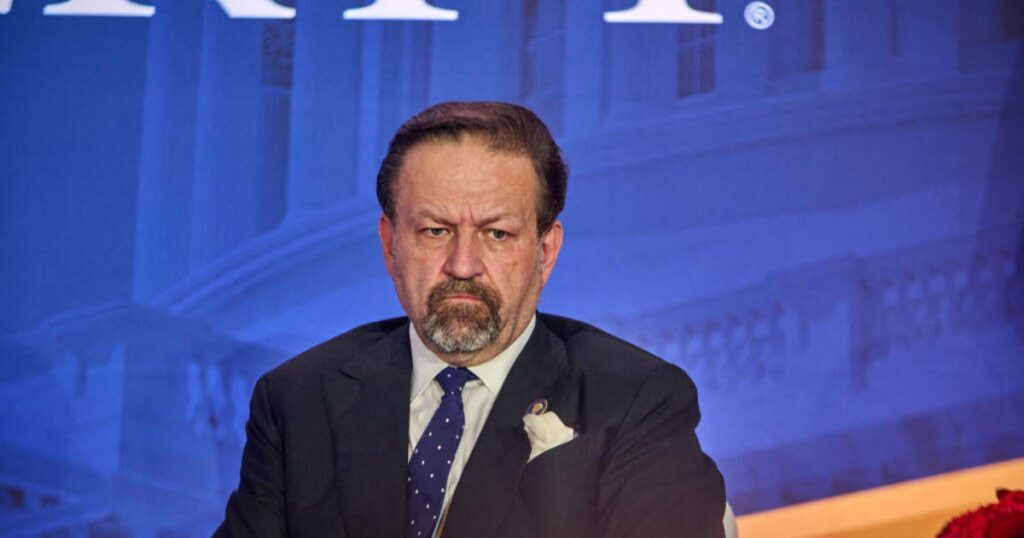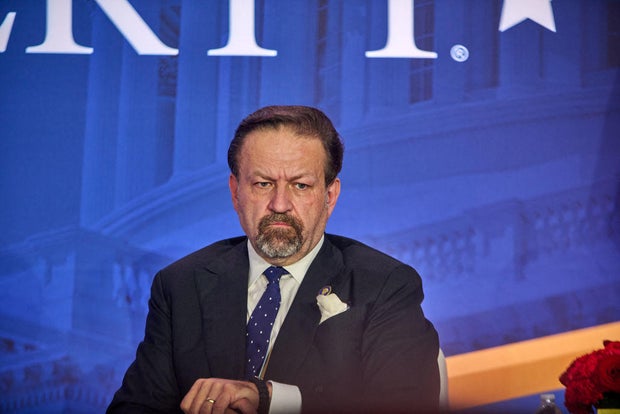President-elect Donald Trump’s pick to be the counterterrorism chief on the White House National Security Council, Sebastian Gorka, is raising concerns among security experts because of his inability to obtain a security clearance early in Trump’s first term.
Gorka was forced to depart after seven months, in August 2017, as a lower-level White House staffer after officials were informed that he would not pass his background investigation, sources have confirmed to CBS News.
DOMINIC GWINN/Middle East Images/AFP via Getty Images
It is unclear whether the past concerns that led to the denial of his security clearance will impede him from obtaining this new, higher-level post. The job of deputy assistant to the president and senior director for counterterrorism does not require Senate confirmation, but neither did his position in the first Trump administration.
A Trump transition source told CBS News that Gorka currently “has an active security clearance with the U.S. government.” But the transition did not respond to requests to clarify whether the Gorka had been given the customary temporary clearance appointees receive as they are preparing to assume their government position and before they go through the more rigorous FBI background investigation.
Trump has the ultimate authority over who serves on his national security team in the White House, and he can bypass recommendations about clearances. Brian Hughes, a spokesman for the Trump transition, defended Gorka’s credentials and told CBS News that “Dr. Gorka has decades of experience working on matters of national security, irregular warfare, and counterterrorism.”
Gorka “will bring a wealth of knowledge and boldness to the National Security Council that will help make America safe again,” Hughes said.
But some former law enforcement and intelligence officials told CBS News they believe Gorka’s past security roadblocks should also be a red flag this time around.
“Typically when someone has been disqualified at some point, unless there is a grace period to allow them to [enter] the process again to see if the issue can me mitigated, they should not be afforded a position of trust in the government,” said Stephen Laycock, who served as executive assistant director for the FBI’s intelligence branch until 2021.
John Bolton, who was Trump’s third national security adviser during his first term and is now a staunch critic of the former president, has said that Gorka should be subjected to a “full FBI field background investigation” before assuming the NSC position.
Gorka has been named as Trump’s pick for one of the most important jobs in the counterterrorism firmament – one that would put him at the center of life-and-death decisions involving elite U.S. forces. The role requires access to some of the most sensitive, compartmentalized intelligence in the U.S. government.
In 2017, Trump had named Gorka, a longtime acolyte and Steve Bannon protégé, to a nebulously defined unit of the National Security Council called the Strategic Initiative Group, a kind of West Wing think tank. John Kelly, Trump’s second chief of staff, was perplexed by Gorka’s role, three sources who worked in the White House said. At the time, the retired four-star Marine general was focused on imposing discipline on a chaotic White House.
“He saw people like (Steve) Bannon and Gorka running around the White House with an open loop to the president,” said one former White House official. When Kelly learned Gorka had been unable to obtain a high-level security clearance for the job, he dismissed Gorka, sources told CBS News.
Why Gorka failed his security screening at that time has not been disclosed, although the review came soon after he was caught by TSA at a security checkpoint carrying a gun into Ronald Reagan National airport. Gorka faced a misdemeanor weapons charge, which was eventually dismissed. Gorka, British-born to Hungarian parents, also was denied clearances to serve on a panel in 2002 that was investigating the then-Hungarian prime minister’s past as a member of the Soviet-era Communist secret police, Buzzfeed News reported in 2017.
A firebrand and MAGA crusader, he endeared himself to Trump as a White House aide during his first term with his frequent cable TV appearances defending the administration’s most controversial “America First” policies, including the so-called “Muslim ban.”
He drew scrutiny for controversial remarks about the Judeo-Christian West being in a civilizational struggle against Islam and for his alleged ties to right-wing Hungarian nationalists. He has also faced questions about his academic credentials (Gorka earned a Ph.D from a relatively obscure Hungarian university and served as an administrative dean at the National Defense University.)
Last month, Gorka was a featured speaker at a MAGA Turning Point USA gathering in Arizona, where he stoked conspiracy theories about last summer’s assassination attempt against Trump in Butler, Pennsylvania. “The most charitable thing you can say about it,” Gorka said ominously, is that “it was failure by design, failure by design, but we will get to the bottom of it.”
As NSC counterterrorism chief, at any given moment, Gorka could be interacting with the president, Pentagon officials or the CIA to help coordinate lethal strikes against suspected terrorists or risky hostage rescues, for instance. It would also be within his purview to steer policies that require the support of diplomatic partners.
One former Trump counterterrorism official recalled that during Trump’s first term, Gorka was involved in efforts to designate Mexico’s drug cartels as a foreign terrorist organization, and he said he expects that Gorka could try to revive that policy push. That redesignation would give the U.S. a stronger legal basis for conducting military operations in Mexico. It was scuttled during the last term over fierce opposition from the State Department.
Some Trump critics told CBS News they are concerned that Gorka’s return could signal a less disciplined approach to managing the White House – in which an array of advisers with competing interests could gain unfettered access to the Oval Office — recreating some of the pitfalls of Trump’s first administration.
“For Trump, process is anathema and discipline is foreign,” said Chris Whipple, an author, former “60 Minutes” producer and documentary filmmaker whose book, “The Gatekeepers,” is a behind-the-scenes study of White House chiefs of staff from Reagan to Trump. “The only qualification that matters is abject loyalty, period,” Whipple said. “And that’s why you have people like … Seb Gorka running around the Oval Office.”
https://www.cbsnews.com/news/trump-sebastian-gorka/



